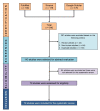Encephalitis in Patients with COVID-19: A Systematic Evidence-Based Analysis
- PMID: 36010650
- PMCID: PMC9406394
- DOI: 10.3390/cells11162575
Encephalitis in Patients with COVID-19: A Systematic Evidence-Based Analysis
Abstract
Although severe acute respiratory syndrome coronavirus 2 (SARS-CoV-2) predominantly infects the respiratory system, several investigations have shown the involvement of the central nervous system (CNS) along the course of the illness, with encephalitis being one of the symptoms. The objective of this systematic review was to evaluate the characteristics (clinical, neuro-radiological aspects, and laboratory features) and outcomes of encephalitis in COVID-19 patients. PubMed, Scopus, and Google Scholar databases were searched from 1 December 2019 until 21 July 2022 to identify case reports and case series published on COVID-19 associated with encephalitis. The quality of the included studies was assessed by the Joanna Briggs Institute critical appraisal checklists. This systematic review included 79 studies, including 91 COVID-19 patients (52.7% male) experiencing encephalitis, where 85.6% were adults (49.3 ± 20.2 years), and 14.4% were children (11.2 ± 7.6 years). RT-PCR was used to confirm 92.2% of the COVID-19 patients. Encephalitis-related symptoms were present in 78.0% of COVID-19 patients at the time of diagnosis. In these encephalitis patients, seizure (29.5%), confusion (23.2%), headache (20.5%), disorientation (15.2%), and altered mental status (11.6%) were the most frequently reported neurologic manifestations. Looking at the MRI, EEG, and CSF findings, 77.6%, 75.5%, and 64.1% of the patients represented abnormal results. SARS-CoV-2-associated or -mediated encephalitis were the most common type observed (59.3%), followed by autoimmune encephalitis (18.7%). Among the included patients, 66.7% were discharged (37.8% improved and 28.9% fully recovered), whereas 20.0% of the reported COVID-19-positive encephalitis patients died. Based on the quality assessment, 87.4% of the studies were of high quality. Although in COVID-19, encephalitis is not a typical phenomenon, SARS-CoV-2 seems like a neuropathogen affecting the brain even when there are no signs of respiratory illness, causing a high rate of disability and fatality.
Keywords: COVID-19; SARS-CoV-2; coronavirus; encephalitis; encephalopathy; meningoencephalitis; systematic review.
Conflict of interest statement
The authors declare no conflict of interest.
Figures
References
-
- World Health Organization WHO COVID-19 Dashboard. 2022. [(accessed on 9 August 2022)]. Available online: https://covid19.who.int.
-
- Islam M.A., Kundu S., Alam S.S., Hossan T., Kamal M.A., Hassan R. Prevalence and characteristics of fever in adult and paediatric patients with coronavirus disease 2019 (COVID-19): A systematic review and meta-analysis of 17515 patients. PLoS ONE. 2021;16:e0249788. doi: 10.1371/journal.pone.0249788. - DOI - PMC - PubMed
-
- Yusuf F., Fahriani M., Mamada S.S., Frediansyah A., Abubakar A., Maghfirah D., Fajar J.K., Maliga H.A., Ilmawan M., Bin Emran T., et al. Global prevalence of prolonged gastrointestinal symptoms in COVID-19 survivors and potential pathogenesis: A systematic review and meta-analysis. F1000Research. 2021;10:301. doi: 10.12688/f1000research.52216.1. - DOI - PMC - PubMed
Publication types
MeSH terms
LinkOut - more resources
Full Text Sources
Medical
Miscellaneous



